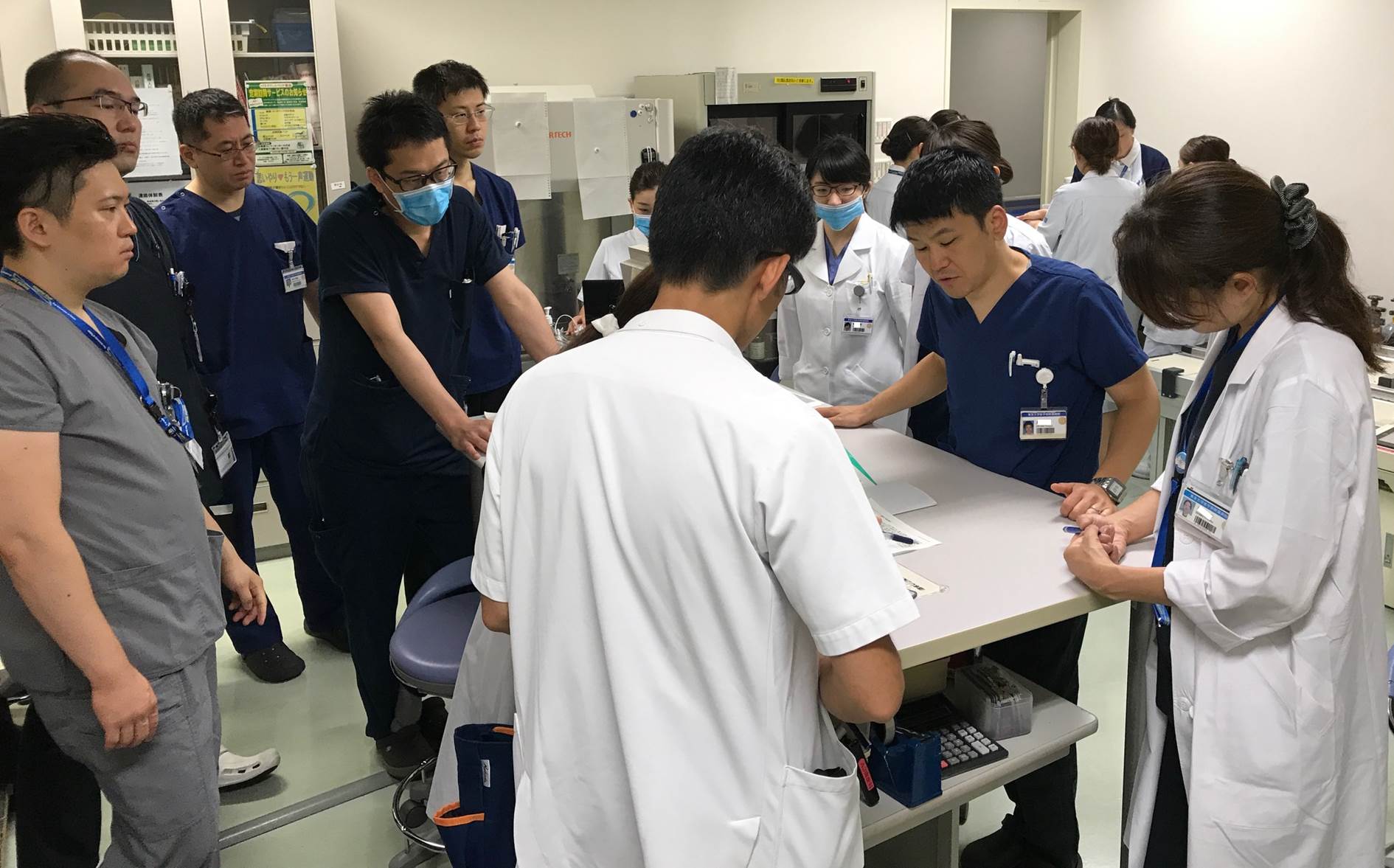
The Department of Obstetrics and Gynecology provides medical care for all phases of a woman’s life from puberty to pregnancy, child birth, and menopause, with a main focus on reproduction. The department supports a wide range of research. The findings are translated to clinical application for improved diagnosis and treatment.
Medical services
The department provides general and specialized outpatient care. Inpatients are treated by a supervising physician and his/ her team.
Diagnosis and treatment policy
A treatment plan is determined not only based on discussion among attending
physicians but also through regular case review meetings with all staff physicians. Joint review meetings with the Departments of Pediatrics and Pediatric Surgery and other departments are also held regularly to provide comprehensive interdisciplinary management of mothers and children.
Specialties
Comprehensive management of care for mothers and children is provided in cooperation with the Departments of Pediatrics and Pediatric Surgery by making extensive use of ultrasound diagnosis in fetuses. Abnormal pregnancies and deliveries are also handled. An emphasis is also placed on treating patients with infertility (habitual abortion) and on reproduction-related problems in all phases of a woman’s life, including in vitro fertilization and other infertility treatments, adolescent amenorrhea, and postmenopausal osteoporosis.
Target diseases
Normal and abnormal pregnancy and delivery, genetic counseling, endocrine abnormality, infertility, adolescent amenorrhea, infertility (habitual abortion), menopause-associated diseases, postmenopausal osteoporosis
Advanced treatments/ Specialized treatments
In vitro fertilization and embryo transfer (IVF-ET), and oncofertility
Oocyte pick-up (OPU) and embryo transfer (ET) are performed 200 cases and 250 cases per year, respectively. Examination for causes of recurrent implantation failure and preimplantation genetic testing for aneuploidy (PGT-A) are provided for the patients who cannot achieve pregnancy after several times of ET. In addition, we are committed ourselves to perform oncofertility; cryopreservation of oocyte or embryo for cancer patients before chemotherapy or radiotherapy.
Treatment of infertility and habitual abortion
Since many factors are associated with habitual abortion, an appropriate treatment plan is developed after careful assessment of the cause. Patients with antiphospholipid antibody syndrome and those with thrombotic tendencies due to a decrease in anticoagulation factors are treated with prednisolone, aspirin and heparin. Favorable results have been achieved in treating patients with these procedures.
Frequently performed tests
- Ultrasound diagnosis of fetal anomalies
- Genetic counseling for patients with late pregnancy and genetic disorders
- Amnio test, hysteroscopy
- NIPT(Non-invasive Prenatal genetic Testing)
- Examination for causes of recurrent implantation failure
- PGT-A (Preimplantation genetic testing for aneuploidy)
Departments/Divisions
Obstetrics and Gynecology, Perinatal Center
Titles
M.D., Ph.D.
Expertise/Specialties
Obsterics and Gynecology, Reproductive Medicine, Reproductive Surgery
Research Interests
Infertility, Implantation Failure, Preterm Birth, Endometriosis and Adenomyosis
Languages
Japanese / English
See More
Major diseases and numbers of inpatients treated
|
Name of operation/treatment |
Number of inpatients |
| 1 |
In-vitro fertilization |
160 cycles |
| 2 |
Embryo transfer (Fresh embryo transfer, Frozen-thawed embryo transfer) |
254 cycles |
| 3 |
Delivery (after 22 weeks of pregnancy) |
965 |
| 4 |
Pregnancy complications |
Approximately 500 (including duplication) |
| 5 |
Delivery after the treatment of habitual abortion |
50 |
| 6 |
Cesarean section |
318 (Cesarean section rate: 33.0%) |
| 7 |
Maternal transport acceptance |
57 |
Areas of expertise, treatment and examination methods
Diseases
- Intractable infertility including implantation failure
- Maternal pregnancy complications
- Placenta previa
- Later life pregnancy and that complicated by genetic disease
- Recurrent and habitual abortion
- Fetal abnormalities
- Premature menopause, menopause, and osteoporosis
- Endometriosis, adenomyosis
Treatment methods
- In-vitro fertilization, embryo transfer, intracytoplasmic sperm injection, and frozen-thawed embryo transfer for intractable infertility
- Low-dose aspirin and heparin therapies for habitual abortion
- Pharmacotherapy, such as hormone therapy for premature menopause, menopause, osteoporosis
Examination methods
- Ultrasound diagnosis for fetal abnormalities
- Genetic counseling and prenatal diagnosis for later life pregnancy and that complicated by genetic disease
- Test for implantation failure
Numbers of major operations and treatments performed
|
Name of operation/treatment |
Number |
| 1 |
Cycles of in-vitro fertilization |
160 |
| 2 |
Fresh embryo transfer cycles (pregnancy) |
59(12:20.3%) |
| 3 |
Cycles of frozen-thawed embryo transfer (pregnancies) |
195(54:27.7%) |
| 4 |
Delivery (after 22 weeks of pregnancy) |
965 |
| 5 |
Cesarean section |
318(Cesarean rate: 33.0%) |
| 6 |
Forceps delivery
Vacuum extractor (VE) delivery |
59
12 |
| 6 |
Painless delivery (under epidural anesthesia) |
182 |
Numbers of major and specialized examinations conducted in this department
|
Name of examination |
Number |
| 1 |
Amniocentesis
Villus sampling
|
approx. 80
approx. 6
|
| 2 |
Hysterosalpingography |
approx. 200 |
| 3 |
Ultrasound fetal diagnosis including screening |
approx. 900 |
| 4 |
Examinations for habitual abortion |
approx. 110 |


